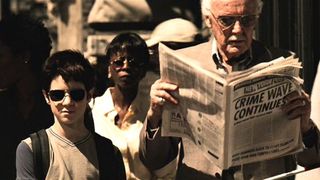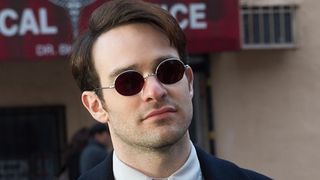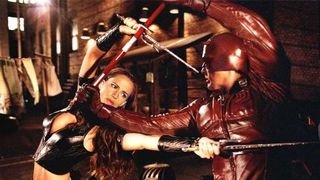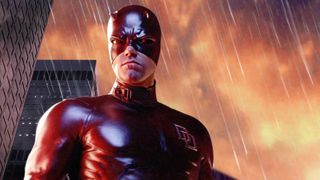After I finished binge-watching the first season of Netflix's Daredevil (the optimal way to consume anything Netflix-made), it shocked me that I was only just discovering how great the concept of this particular hero is. Between a superhero with skills and ambitions outside his supersona; a villain who is genuinely empathetic and terrifying at the same time; a supporting cast that's every bit as enthralling as the main hero; and a story that feels honest and intense without wallowing in its own angst, Daredevil proves that even the well-trod territory of the superhero origin story can still feel fresh, intriguing, and worthwhile.
It made me wonder why I didn't latch onto the character of Daredevil before, when I saw the Ben Affleck movie (now a foggy memory) some twelve years ago. I dug a copy of the film out of the internet ether, itching to see what I missed. I now have a brand new respect for the Daredevil TV show, because that movie is terrible (even Affleck says so) and the Daredevil show very clearly benefits from the passage of time.
For those who don't know/remember what made the Daredevil movie so bad, you don't have to get too deep into a viewing to realize something's off. After opening on our hero Matt Murdock collapsing on the floor of a church to establish some intrigue (because holy crap do you need it to get through the next fifteen minutes), the film goes into a flashback that blazes through all the interesting parts of Matt's origin story at top speed, proving that it doesn't actually care about its main character.

His transformation from a confused blind child to sonar kung-fu master is given less than five minutes of screen-time. That's not hyperbole - Matt goes blind just before the nine minute mark, and by minute thirteen he's doing handstands on the edge of a roof and back-flip-kicking bullies in the face. It communicates none of the struggle and determination that makes him such a complex and interesting adult, and which the show uses to fantastic effect in establishing who he is.
His relationship with his father gets even less attention, as Pop Murdock offhandedly mentions he doesn't want Matt fighting people (a grand total of once, with a cursory explanation as to why) before he does a so-so reenactment of the Wayne parents' demise and is utterly forgotten. At the end of the first fifteen minutes we know nothing about Matt Murdock except that he's a series of superhero cliches stacked on top of each other, and he can kick hard.
But that's okay, because it's not like the rest of the movie was going to be about him anyway. Where the show takes time to ruminate on Matt's inner turmoil and wavering faith as he tries to understand if he can be both good and effective, the movie launches right into needlessly long fight sequences that could have been from any action flick, really. They don't string together in a way that's interesting or thoughtful, and they don't have to, because the film's focus is on making space for them at all costs.

While there's apparently no time to explain how Matt knows about Kingpin (played by the late Michael Clark Duncan in one of the film's few good performances) or what the dastardly villain has done to Hell's Kitchen in the twenty-odd years since Pop Murdock's death (it just… never comes up), crowbarring in a needless fight between Daredevil and Elektra was a matter of utmost importance. Where the show tries to define Daredevil by why makes him unique, the movie is a series of action-film mad libs given life.
The action does, however, make some room for one of the most cringe-worthy romances ever committed to film. Matt and Elektra (played by Jennifer Garner) have little chemistry and nothing worthwhile to say to each other, so every scene where they appear together rapidly devolves into cloying nonsense. Their logic-defying first date - where the two battle Crouching-Tiger style in broad daylight in front of a pack of mesmerized children, Matt seemingly not at all concerned about completely blowing his secret identity - is an ominous start, and it just gets worse from there. I could only watch the hero 'romantically' harass a complete stranger or see the two of them shove their mouths together like fighting mudskippers for so long before my will to live started eking away. It wouldn't be quite so bad if the entire movie didn't suffer for it, shoving aside other potentially interesting plotlines so we can watch Matt and Elektra stare at each other in the rain while Evanescence plays, but there you go.

Thankfully, the show is essentially everything the film isn't - where the movie goes to great pains to make sure 75% of the runtime involves someone getting kicked in the face, the show dials down the face-kicking to something like 33%, devoting the rest of its space to character and plot development.
We get to see Matt, Foggy, and Karen (who is called by name and is onscreen for more than twenty seconds, unlike in the movie) solve as many problems through smart legal work as they do through violence, making them seem much more realistic and interesting. Characters who are insufferable jerks or non-entities in the film - like Ben Urich and Kingpin's right hand man Wesley - have personalities and stories of their own, so although you’re (probably) not rooting for them, they still feel worthy of empathy. Even the Kingpin, in what may be the show's masterstroke, becomes a sympathetic figure worthy of compassion, so Matt's inner grief over whether he is (or can ever be) good feels like a genuinely uncertain question, rather than an flimsy thread to build nunchaku fights around.
The Daredevil TV show is, blessedly, a product of its time. Where the film was born out of the cultural landscape of the early 2000's, when the new wave of comic book movies was still young and every movie wanted to be The Matrix, the show has benefited significantly from Marvel's current quirk-and-character ethos. In a way, Daredevil is the clearest example of how far superhero productions have come over the last decade and a half - fewer villains with targets carved into their heads, more shwarma (or Daredevil's equivalent, drinking the eel). So when Daredevil season 2 premieres this week, treading into that uncertain territory that comes after the origin story, I know I'll at least appreciate how far Matt Murdock has come. Just never, ever, mention the guardian devil again.


